إِنَّمَا يَتَقَبَّلُ اللَّهُ مِنَ الْمُتَّقِينَ | The Secret of Accepted Deeds
"Indeed, Allah accepts only from the righteous." — [Surah Al-Mā’idah, 5:27]
After every act of worship—whether it be ʿUmrah, Ḥajj, fasting, prayer, charity, or any righteous deed— we need to be concerned about its acceptance by Allah.
Imām Ibn Rajab al-Ḥanbalī رحمه الله records that:
“It was reported from ʿAlī ibn Abī Ṭālib رضي الله عنه that he would call out on the last night of Ramadān: ‘Oh, how I wish I knew—who among us is accepted so that we may congratulate him? And who among us is deprived so we may console him?’”
Likewise, ʿAbdullāh ibn Masʿūd رضي الله عنه would echo the same sentiment:
“Who is accepted from among us so we may congratulate him? And who is deprived so we may console him? O accepted one, congratulations to you. O rejected one, may Allah console your loss.”
For while being granted the ability to do good is a tremendous blessing, an even greater one is to have that deed accepted. When a believer realises that many actions are rejected due to various hidden reasons, the most important concern becomes: Have I fulfilled the conditions of acceptance? If you find signs of sincerity and uprightness in yourself, praise Allah and seek consistency. But if you do not, then let today mark the beginning of your journey toward doing deeds with deeper sincerity and a stronger connection to Allah ﷻ.
After the spiritual heights of Ramadan, many believers wonder: Have my deeds been accepted? The companions of the Prophet ﷺ — despite their piety and tremendous efforts — were deeply concerned about the acceptance of their deeds.
Ibn Abī Mulaykah said, “I met thirty of the companions of the Prophet ﷺ, every one of them feared hypocrisy for himself.” Abu al-Dardāʾ even said, “If I were certain that Allah accepted just one prayer from me, it would be dearer to me than the whole world and all it contains,” citing the divine words: {Indeed, Allah accepts only from the muttaqīn} (al-Mā’idah: 27).
Acceptance hinges on two pivotal pillars: sincerity (ikhlāṣ) and adherence to the Sunnah. The Prophet ﷺ said: “Whoever does a deed that is not in accordance with our matter, it will be rejected” (Bukhārī & Muslim). And, “Actions are judged by intentions” (Bukhārī). Thus, an accepted act must be pure in motive and correct in method. As al-Fuḍayl ibn ʿIyāḍ beautifully summarised: “The most sincere and the most correct — that is the deed Allah accepts. Sincerity is for Allah alone, and correctness is by following the Sunnah.”
In fact, Allah said in a hadith qudsi: “I am the most self-sufficient of all partners. Whoever performs an act and associates with Me someone else in it, I abandon him and his shirk” (Muslim). This reminds us that even the grandest actions — if tainted with showing off or lacking prophetic guidance — may be cast away.
The Story Behind the Verse:
The verse is revealed in the context of the story of the two sons of Ādam — often understood to be Qābīl and Hābīl (Cain and Abel). Both brothers offered a sacrifice to Allah. One was accepted, and the other was not. The Qur’an says:
وَاتْلُ عَلَيْهِمْ نَبَأَ ابْنَيْ آدَمَ بِالْحَقِّ إِذْ قَرَّبَا قُرْبَانًا فَتُقُبِّلَ مِنْ أَحَدِهِمَا وَلَمْ يُتَقَبَّلْ مِنَ الْآخَرِ قَالَ لَأَقْتُلَنَّكَ ۖ قَالَ إِنَّمَا يَتَقَبَّلُ اللَّهُ مِنَ الْمُتَّقِينَ
"And recite to them the story of Ādam’s two sons, in truth: when they both offered a sacrifice to Allah, and it was accepted from one of them but not from the other. One said, 'I will surely kill you.' The other replied, 'Indeed, Allah accepts only from the righteous.'" (Al-Mā’idah: 27)
According to reports, one of the brothers (Hābīl) offered the best of his livestock with sincerity, while the other (Qābīl) offered inferior produce without devotion. The rejection provoked jealousy and rage — leading to the first murder in human history.
Acceptance of Ramadan
In the weeks after Ramadan, as routines settle back in, the question remains: Was my Ramadan accepted? The answer lies not in how much we did, but how sincerely and rightly we did it. Let our greatest concern not be the quantity of worship, but the quality and acceptance of it. And may Allah, the Most Merciful, accept our deeds and make us among the muttaqīn.
The righteous predecessors were known to make duʿā for six months prior to Ramadān, begging Allah to allow them to reach it. But their devotion didn’t end there.
Imām Muʿallā ibn al-Faḍl رحمه الله said:
“They used to supplicate Allah for six months that He let them reach Ramadān, and then supplicate for another six months that He accept it from them.”
Acceptance (qabūl) was not assumed; it was hoped for, pleaded for, and wept over.
Imām Ibn Rajab رحمه الله also noted that:
“The Salaf used to consider the one who dies after completing a righteous act—like fasting Ramadān or performing Ḥajj or ʿUmrah—as one whose end was praiseworthy and that it was hoped he would enter Jannah.”
The Fear of Rejection: A Sign of True Belief
The unease that settles in the hearts of believers after acts of worships and righteousness is not a sign of weakness—it is a sign of sincere īmān. Allah ﷻ Himself describes His devout servants with such trembling hearts:
{Indeed, those who are apprehensive from fear of their Lord,
And those who believe in the signs of their Lord,
And those who do not associate anything with their Lord,
And those who give what they give while their hearts are fearful because they will be returning to their Lord –
It is those who hasten to good deeds, and they outstrip others therein}
(Sūrat al-Mu’minūn, 23:57–61)
This noble fear—wajl—is not from sin alone, but even from the possibility that sincere deeds might not be accepted. This is confirmed in a profound narration from our mother ʿĀʾishah رضي الله عنها. She asked the Messenger of Allah ﷺ about the meaning of the verse:
وَالَّذِينَ يُؤْتُونَ مَا آتَوا وَّقُلُوبُهُمْ وَجِلَةٌ أَنَّهُمْ إِلَىٰ رَبِّهِمْ رَاجِعُونَ (60)
{And those who give what they give while their hearts are fearful} (23:60):
“Are they the ones who drink alcohol and steal?” she inquired.
The Prophet ﷺ replied:
“No, O daughter of al-Ṣiddīq. Rather, they are the ones who fast, pray, and give charity, yet they fear that it may not be accepted from them. They are the ones who hasten in doing good.”
(Narrated by Aḥmad and al-Tirmidhī)
Al-ʿAllāmah al-Mubārakfūrī رحمه الله explains in Tuḥfat al-Aḥwadhī:
“It means: they give in charity and perform righteous actions, yet their hearts tremble out of fear that these deeds may not be accepted.”
Even the greatest of the Prophets displayed this humility before Allah. Ibrāhīm عليه السلام and his son Ismāʿīl عليه السلام were commanded to raise the foundations of the most sacred House on earth, the Kaʿbah. As they obeyed and constructed it, they made duʿā:
وَإِذْ يَرْفَعُ إِبْرَاهِيمُ الْقَوَاعِدَ مِنَ الْبَيْتِ وَإِسْمَاعِيلُ رَبَّنَا تَقَبَّلْ مِنَّا ۖ إِنَّكَ أَنتَ السَّمِيعُ الْعَلِيمُ (127 البقرة )
{And [mention] when Ibrāhīm was raising the foundations of the House and [with him] Ismāʿīl, [saying], ‘Our Lord, accept [this] from us. Indeed You are the All-Hearing, the All-Knowing.’}
(Sūrat al-Baqarah, 2:127)
When Wahb ibn al-Ward رحمه الله would recite this verse, he would weep and say:
“O Friend of the Most Merciful! You are building the foundations of Allah’s House, and yet you fear it may not be accepted?”
And consider the wife of ʿImrān, the mother of Maryam. When she devoted the child in her womb to the service of Allah, she supplicated with the same hope:
إِذْ قَالَتِ امْرَأَتُ عِمْرَانَ رَبِّ إِنِّي نَذَرْتُ لَكَ مَا فِي بَطْنِي مُحَرَّرًا فَتَقَبَّلْ مِنِّي ۖ إِنَّكَ أَنتَ السَّمِيعُ الْعَلِيمُ (35 آل عمران )
{[Mention] when the wife of ʿImrān said, ‘My Lord, indeed I have pledged to You what is in my womb, devoted [to Your service], so accept this from me. Indeed, You are the All-Hearing, the All-Knowing.’}
(Sūrat Āl ʿImrān, 3:35)
This concern over acceptance was not limited to the Prophets and their families. Even the companions of the Prophet ﷺ, in all their devotion and sacrifice, feared rejection more than worldly loss.
ʿAbdullāh ibn Masʿūd رضي الله عنه said:
“To know that Allah has accepted one deed from me would be more beloved to me than having the earth filled with gold.”
Abū al-Dardāʾ رضي الله عنه echoed this, saying:
“To be certain that Allah has accepted even one prayer from me would be dearer to me than the whole world and what it contains, for Allah says:
{Indeed, Allah accepts only from the righteous.} (Sūrat al-Māʾidah, 5:27)”
Balancing Between Fear and Hope
A believer’s path to Allah is not walked with certainty of acceptance, but with a trembling heart full of hope. The successful one is he who combines deep fear of falling short with sincere hope in Allah’s mercy. As the Qur'an portrays:
{Is one who is devoutly obedient during periods of the night, prostrating and standing [in prayer], fearing the Hereafter and hoping for the mercy of his Lord?} (Az-Zumar: 9). Ibn Kathīr explains: true worship demands both fear and hope—fear dominates during one’s lifetime to preserve humility, and hope rises especially near death, when one returns fully to the mercy of Allah.
Hope is not an empty wish but a confident trust rooted in obedience. Allah says:
{Indeed, those who recite the Book of Allah, establish prayer, and spend from what We have provided them, secretly and publicly—they hope for a trade that will never perish. That He may give them in full their rewards and increase for them from His bounty. Indeed, He is Oft-Forgiving, Most Appreciative} (Fāṭir: 29–30).
Ibn Kathīr beautifully comments: “They hope for a reward that is guaranteed.”
This hope is not blind; it stems from action and is built on Allah’s promises. Yet even with great deeds, the believer does not rely on his work. As the Prophet ﷺ taught:
“None of you will enter Paradise by his deeds.”
They asked: “Not even you, O Messenger of Allah?” He replied:
“Not even me—unless Allah envelops me in His mercy and grace” (Bukhārī & Muslim).
Hence, acceptance is not earned through quantity, but sincerity, submission, and divine grace.
As Imām al-Bukhārī titled in his Ṣaḥīḥ, “Chapter on Hope Alongside Fear,” Ibn Ḥajar commented: it is recommended not to separate hope from fear—so one does not fall into arrogance by excessive hope, nor despair from excessive fear. And Abu ʿUthmān al-Jayzī summarised it well:
“A sign of happiness is to obey while fearing rejection; and a sign of wretchedness is to sin while hoping to escape.”
Indeed, fear reminds us that deeds can be rejected due to pride, show, or ingratitude—as Allah says:
{Do not invalidate your charities with reminders or hurtful words} (Al-Baqarah: 264).
But hope reminds us that the door of mercy never shuts, and that the Most Merciful multiplies rewards, accepts the little, and turns even the fallen back to Him with forgiveness and bounty.
So walk between a heart that trembles and a soul that trusts—and know that the One you turn to is Ghāfūr, Shakūr: Ever Forgiving, Most Appreciative.
Signs of Acceptance
Among the most telling signs of a heart accepted by Allah is its distaste for sin and love for righteousness. A believer who despises returning to disobedience after having tasted the sweetness of closeness to Allah is someone whose heart is alive.
A man once asked the Prophet ﷺ, "What is īmān?" The Prophet ﷺ replied, "If your good deed pleases you and your bad deed saddens you, then you are a believer." The man then asked, "What is sin?" He ﷺ said, "If something causes unease in your chest, then leave it." [Aḥmad & al-Ḥākim, ṣaḥīḥ]
This narration teaches that true īmān is not merely professed by the tongue but felt in the heart. When one rejoices in obeying Allah and feels remorse over disobedience, it is a sign of a living heart and a sincere soul. Likewise, ithm (sin) often announces itself through internal discomfort—ḥayāʾ (modesty), conscience, and divine awareness stir the believer’s heart before the sin even manifests fully.
One of the most powerful signs of qubūl—acceptance of deeds—is steadfastness after the season of obedience, and continued remembrance of Allah in all states. The verse ﴿ رِجَالٌ لَّا تُلْهِيهِمْ تِجَارَةٌ وَلَا بَيْعٌ عَن ذِكْرِ اللَّهِ ﴾ describes the character of hearts that have truly tasted the sweetness of īmān. Such hearts are not seasonal in their devotion; they do not retire from righteousness when Ramadan departs, nor do they let worldly engagements distract them from the One they live for.
Remaining committed to dhikr, to ṣalāh, and to zakāh, even amid the hustle of trade and daily responsibilities, is a sign that the soul has been purified and the actions accepted. As the verse beautifully concludes, these are people who fear the Day when hearts and eyes will tremble—a fear that doesn’t paralyse them, but refines them. Their consistency is born out of awe, love, and certainty in meeting their Lord.
Istighfār at the end of righteous acts is essential for acceptance. All the acts of worship conclude with istighfār (seeking forgiveness)—after ḥajj: {Then depart… and seek forgiveness of Allah} (Al-Baqarah 199); after ṣalāh, we say Astaghfirullāh three times; and the pious conclude their nights of qiyām with istighfār at dawn (Adh-Dhāriyāt 18). Even the Prophet ﷺ was commanded to conclude his mission of daʿwah with {So glorify your Lord and seek His forgiveness} (An-Naṣr 3).
Thus, the one who remains conscious of Allah after obedience, and continues to guard their duties and reflect upon the hereafter, has strong reason to hope that their deeds were not in vain. As ʿAlī (raḍiyallāhu ʿanhu) once said: “Be more concerned with the acceptance of a deed than the deed itself.”
Disclaimer
The views expressed in this article are the author’s own and do not necessarily mirror Islamonweb’s editorial stance.

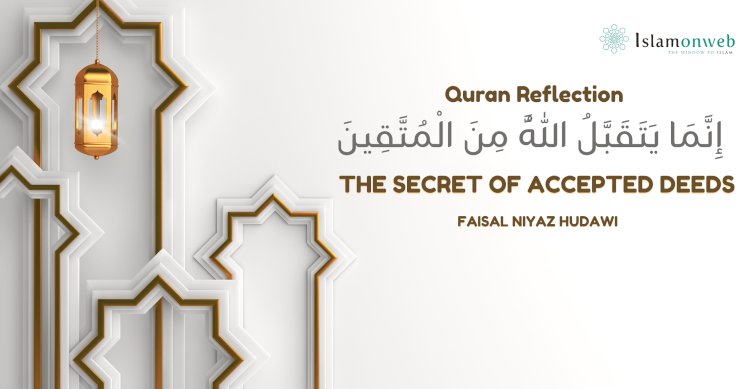




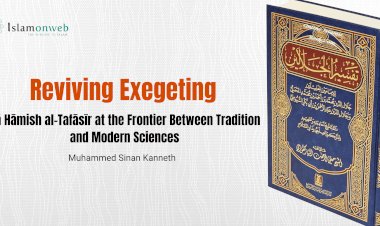
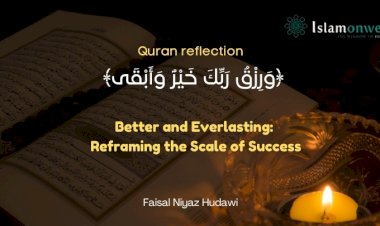
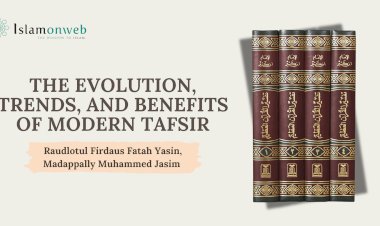
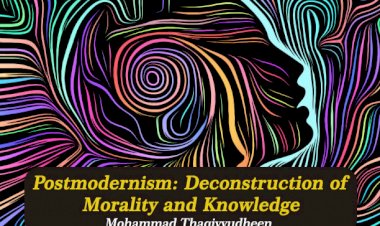














Leave A Comment